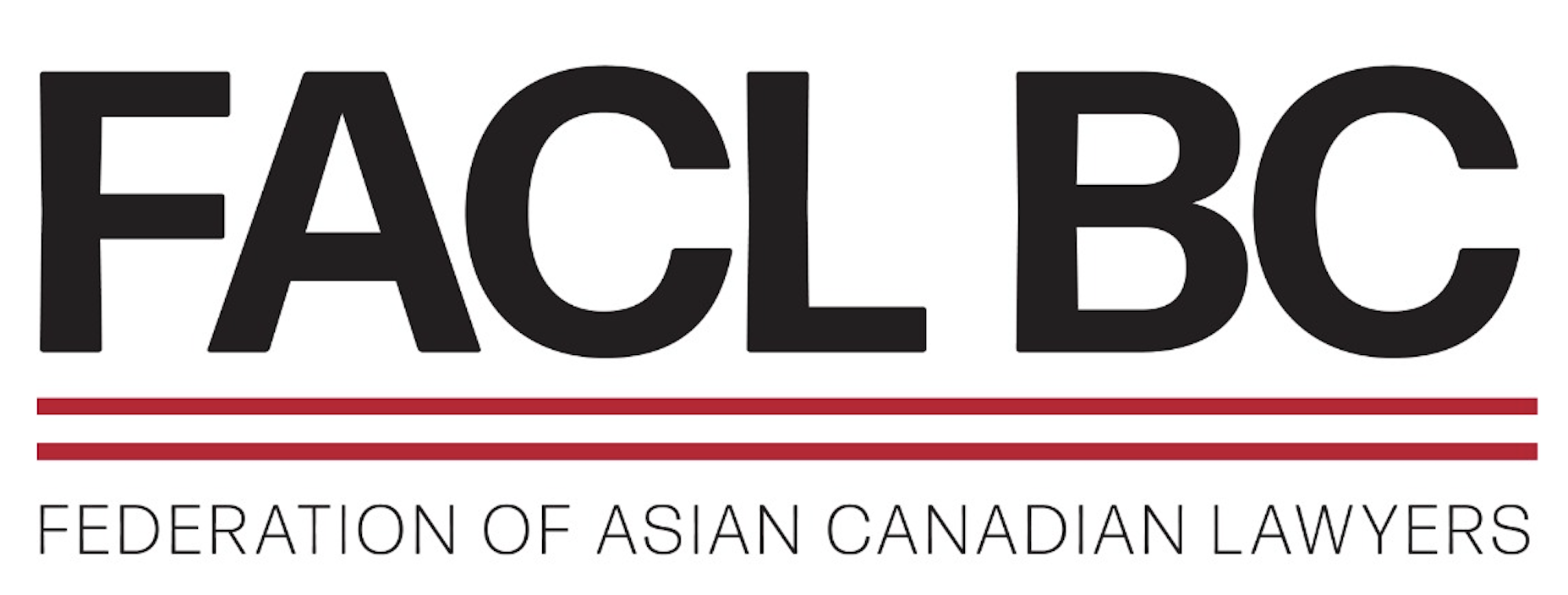The Federation of Asian Canadian Lawyers (British Columbia) Society (FACL BC) is a diverse coalition of Asian Canadian legal professionals working to promote equity, justice, and opportunity for Asian Canadian legal professionals and the wider community. To support the students of this community, we award a number of annual scholarships to current BC law students of pan-Asian descent.
In November 2023, we awarded 2 scholarships at our Annual Gala. Visit faclbc.ca/scholarship to view our previous scholarship recipients.
FACL BC Scholarships at Upcoming Annual General Meeting
FACL BC is pleased to announce that we will award 4 scholarships (“Scholarships”) in the amount of $1,000 each at our upcoming Annual General Meeting on July 11, 2024. These scholarships are made possible by the support of TD Bank Group, as our Exclusive Financial Partner for the 2023-2024 year.
The FACL BC Scholarships recognize current and incoming law students enrolled in a law school in British Columbia, graduating between 2025 and 2027, who demonstrate a keen interest in and willingness to contribute to the Asian Canadian legal community. Consideration will be given to applicants’ leadership and community involvement, and financial need.
FACL BC will endeavour to allocate the FACL BC Scholarships to Juris Doctor candidates enrolled at the Thompson Rivers University Faculty of Law (“TRU”), University of Victoria Faculty of Law (“UVic”), and UBC Peter A. Allard School of Law (“Allard”), as well as incoming LLM in Common Law (LLMCL) candidates enrolled at Allard.
Selection Process
-
Each application that meets the requirements set out below will be reviewed by current FACL BC Executive members on a “blind resume review” basis, with all identifying personal information redacted and anonymized prior to consideration.
-
FACL BC exercises sole and absolute discretion to determine scholarship eligibility and scholarship recipients.
-
FACL BC’s decisions are final. Application materials will not be returned to applicants.
- Scholarship recipients will be notified of FACL BC’s decision by July 8, 2024, and the scholarship will be presented at FACL BC’s Annual General Meeting on July 11, 2024.
Eligibility Requirements
To be eligible for a FACL BC Scholarship, students must:
-
self-identify as of pan-Asian descent (South Asian, Southeast Asian, East Asian, Central/West Asian);
-
demonstrate past, current and/or future involvement in promoting equity, justice and opportunity for pan-Asian Canadian legal professionals and/or the wider community in British Columbia, with previous involvement with FACL BC preferred;
-
be able to attend FACL BC’s Annual General Meeting via Zoom on Thursday, July 11, 2024 at 5 pm (Pacific Time); and
-
be a current student member of FACL BC (note: Student Membership is complimentary, sign up at faclbc.ca/join); and
-
consent to having their name (photo and short bio optional) displayed on our webpage at faclbc.ca/scholarship.
Please note that past scholarship recipients, FACL BC Student Directors, and student contractors including Executive Coordinators and Associate Director (both current and former) are not eligible to apply.
Application
To apply for a FACL BC Scholarship, please complete the application form here by no later than 11:59 PM on July 2, 2024.
New Scholarships at BC Law Schools
In addition to the 4 FACL BC Scholarships which will be awarded at our upcoming Annual General Meeting, FACL BC is pleased to announce that it has set up official and recurring scholarships at the University of Victoria Faculty of Law and Thompson Rivers University Faculty of Law commencing September 2024. These scholarships will be awarded by the schools annually until 2027.
Please refer to the respective schools’ official scholarship websites for more information on how to apply.
University of Victoria Faculty of Law
The award will be granted to an Asian Canadian undergraduate student entering or continuing in the Faculty of Law at UVic. Preference will be given to students who demonstrate financial need and further preference is for students who are the first in their immediate family to attend a law school. Approval of the recipients is made by the Senate Committee on Awards upon the recommendation of the Faculty of Law.
Amount
$1,000 per year, over 3 years, will be awarded to 1 successful candidate for an expected total value of $3,000.
Eligibility Requirements
Application
The Award will be administered by the UVic Student Awards and Financial Aid Office, in accordance with the policies and procedures for undergraduate awards.
View the Award by visiting this page here and navigating to the “Scholarships: F-L” tab.
Thompson Rivers University Faculty of Law
The award will be intended for a TRU student enrolled in the JD program, who self-identifies as “Asian Canadian”. Preference will be given to students who demonstrate financial need and who are the first in their immediate family to attend a law school. The purpose of the gift is to support Asian Canadian law students.
Amount
$1,000 per year, over 3 years, will be awarded to 1 successful candidate for an expected total value of $3,000.
Eligibility Requirements
Application
Faculty Adjudicated - Apply Directly.
View the Award by visiting here and filtering the award results specific to the Faculty of Law.
UBC Peter A. Allard School of Law
FACL BC will self-administer a scholarship to one JD candidate at Allard closer to September 2024. More details to follow in the late summer.
We look forward to receiving your applications to the FACL BC Scholarships and partnering with TRU and UVic to provide additional scholarships commencing September 2024!
If you have any questions regarding the above scholarships, contact finance@faclbc.ca.
